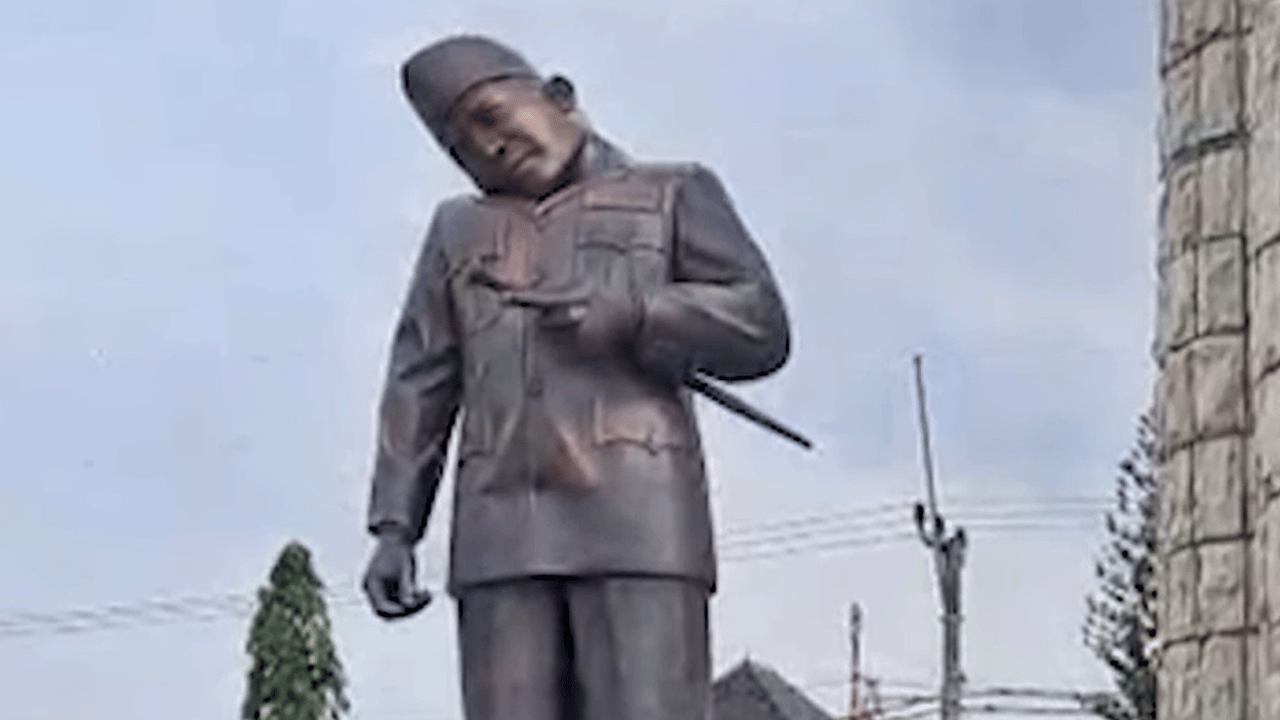- Nusantara Notes
- Posts
- Not quite Amran's Tempo | November 19, 2025
Not quite Amran's Tempo | November 19, 2025
Court throws out minister's defamation lawsuit

Hello reader,
There’s a big win for press freedom in Indonesia: a court threw out Agriculture Minister Amran Sulaiman’s IDR 200 billion defamation lawsuit against Tempo. Sometimes there are glimmers of hope for democracy in Indonesia, and may we see more of it.
Elsewhere, thrifting is so in fashion that it might not make sense for the government to ban it, and a Soekarno statue looked like it had a stiff neck. Enjoy!
Cheers,
Andra
Smart Investors Don’t Guess. They Read The Daily Upside.
Markets are moving faster than ever — but so is the noise. Between clickbait headlines, empty hot takes, and AI-fueled hype cycles, it’s harder than ever to separate what matters from what doesn’t.
That’s where The Daily Upside comes in. Written by former bankers and veteran journalists, it brings sharp, actionable insights on markets, business, and the economy — the stories that actually move money and shape decisions.
That’s why over 1 million readers, including CFOs, portfolio managers, and executives from Wall Street to Main Street, rely on The Daily Upside to cut through the noise.
No fluff. No filler. Just clarity that helps you stay ahead.
Law/Politics
The South Jakarta District Court has accepted Tempo’s preliminary objection in the IDR 200 billion defamation lawsuit filed by Agriculture Minister Amran Sulaiman, who accused the publication of damaging his reputation through a May 2025 article about state logistics company Bulog’s rice procurement strategy. The court ruled that journalistic disputes fall under the authority of the Press Council rather than the general courts. Press advocates praised the ruling as a crucial affirmation of press freedom and labeled the lawsuit an attempt at silencing criticism, while the ministry expressed disappointment and vowed to refile the case elsewhere, insisting the reporting had damaged the dignity of millions of farmers.
The House of Parliament (DPR) Commission III held a working meeting with the National Police to review a wide range of issues, from underperforming regional criminal investigation units and police chiefs to widespread internal problems such as abuse of power, weak supervision, and slow public service. Deputy Police Chief Commissioner General Dedi Prasetyo highlighted that 62% of internal problems stem from regional units, with significant cases of police brutality, including excessive firearm use, reported across multiple provinces. He also noted slow response times at police service centers, causing the public to prefer calling the fire department instead. Following recent large protests, the National Police said it is evaluating and shifting its approach to handling demonstrations toward more humanistic methods, acknowledging persistent public complaints and the urgent need for systemic reforms in recruitment, oversight, and service delivery.
A student activist at Universitas 17 Agustus 1945 (UTA’45) Jakarta, Damar Pamungkas, was suddenly suspended for three months after organizing a campus discussion titled “Soeharto Is Not a Hero,” held on the same day President Prabowo Subianto awarded Soeharto the title of national hero. The campus accused him of mobilizing political activity and violating academic rules, while locking the venue, blocking students, and involving police pressure to halt the event. Damar argues the forum was an academic space to examine Soeharto’s controversial legacy, which was marked by corruption, repression, and human rights abuses. Critics, including education observers, say the university’s actions mirror New Order–style repression and reflect a wider decline in campus democracy, as students face intimidation for expressing dissent against the government’s effort to rehabilitate Soeharto’s image.
The Solo, Central Java branch of the General Elections Commission (KPU) clarified that former president Joko Widodo’s 2005 mayoral candidacy documents, including his diploma, are still completely intact, countering public concern after a recent Information Commission hearing raised questions about alleged destruction of files amid a never-ending saga surrounding the legitimacy of Jokowi’s college diploma. The chair, Yustinus Arya Artheswara, explained that only the log of incoming letters is allowed to be destroyed after its retention period, not the actual registration documents. He emphasized that KPU Solo has never carried out any destruction of Jokowi’s files, has repeatedly submitted the diploma for past legal processes, and that some requested materials could not be provided simply because they fall under the authority of KPU in Jakarta.
Officials at the National Nutrition Agency (BGN) confirmed that Yasika Aulia Ramadhani, daughter of the Deputy Speaker of the South Sulawesi Regional Legislative Council (DPRD), controls 41 kitchens under the government’s Free Nutritious Meals (MBG) program, sparking public criticism over potential abuse of the system. BGN said Yasika obtained the kitchens by registering multiple foundations, bypassing the rule that limits each organization to a maximum of ten units. The controversy grew after the issue went viral, with critics questioning why a 20-year-old could manage such a large share of facilities intended for broad public benefit. While BGN acknowledged the irregularity, its leadership claimed they do not personally know applicants because registrations occur through an online system, and argued that rapid expansion of MBG kitchens has helped accelerate program rollout.
Business/Economy
Second-hand clothing sellers are urging the government to legalize thrifting businesses rather than shut them down, arguing that the sector supports around 7.5 million livelihoods nationwide and has existed for generations. Speaking at a House of Representatives (DPR) hearing, proponents argued legalization would allow traders to pay taxes and operate transparently, similar to practices in many developed countries. They warned that eliminating thrifting would endanger millions of people who depend on it, and proposed that if full legalization is not possible, the government should at least introduce a limited-import or quota system instead of an outright ban.
The Financial Services Authority (OJK) has issued a new regulation stating that bank accounts with no activity for more than five years will automatically be classified as dormant, tightening governance and consumer protection in the banking sector. Under the regulation, banks must categorize accounts into active, inactive (no activity for over one year), and dormant (no activity for over 1,800 days), while ensuring clear procedures, data updates, fraud prevention, and easy reactivation or closure for customers through both physical branches and digital channels.
President Prabowo inaugurated the Emirates–Indonesia Cardiology Hospital in Solo, Central Java, which is a state-of-the-art cardiac facility built with an IDR417.3 billion (US$25 million) grant from the United Arab Emirates. He framed the project as part of the state’s duty to provide quality healthcare, praising the UEA’s support and calling the hospital a symbol of the two countries’ close ties. Located in Solo Technopark and operated by the Health Ministry, the hospital is equipped with advanced technology, including a hybrid cathlab, CT scan, MRI, and offers 130 beds along with emergency, inpatient, ICU, cathlab, and cardiac surgery services.
Energy and Mineral Resources Minister Bahlil Lahadalia announced he will pull all quartz sand mining permits back to the central government after a task force uncovered illegal mining in Bangka Belitung that allegedly caused IDR 12.9 trillion in state losses. A task force found that permits for quartz sand were being misused as cover for illegal tin mining across more than 315 hectares, where dozens of excavators and sand-suction machines were seized. Although mining permits were originally centralized, a 2022 presidential regulation had delegated some authority to local governments, an arrangement Bahlil now says must be reversed following the massive illegal operations uncovered.
Danantara’s CIO Pandu Sjahrir confirmed that Finance Minister Purbaya Yudhi Sadewa will join the asset manager’s delegation to China to negotiate the Jakarta–Bandung high-speed rail (Whoosh) debt, although he declined to reveal the travel schedule. Purbaya said he wants to be directly involved in the talks to fully understand the process and ensure the outcome benefits the state, while reiterating his personal reluctance to use the national budget to cover the project’s liabilities.
Everything Else

A statue of Indonesia’s first president, Soekarno, located at the town square in Indramayu, West Java, was found leaning with its neck visibly damaged after a strong gust of wind caused an event tent to collapse onto it. The incident occurred following preparations for an inauguration ceremony on November 12, when the falling tent struck the statue’s head and neck. Officials confirmed that the Soekarno statue, made of copper, requires repair by its original sculptor using heavy equipment, prompting authorities to temporarily take it down. Although the adjacent Hatta statue remains intact, it will also be removed for safety while restoration work is carried out.
Bali is moving to ban “private beaches” after rising complaints that hotels and villas are blocking shoreline access, making it difficult for locals to perform key Hindu rituals and for tourists to reach the coast. Governor I Wayan Koster has submitted a draft regulation to protect public access, stressing that beaches are state-owned public spaces under existing law but are increasingly treated as exclusive property by commercial operators. Incidents have ranged from residents being turned away during ceremonies to viral cases of tourists and locals being removed for “trespassing,” as well as conflicts involving beach clubs ignoring religious events.




Reply